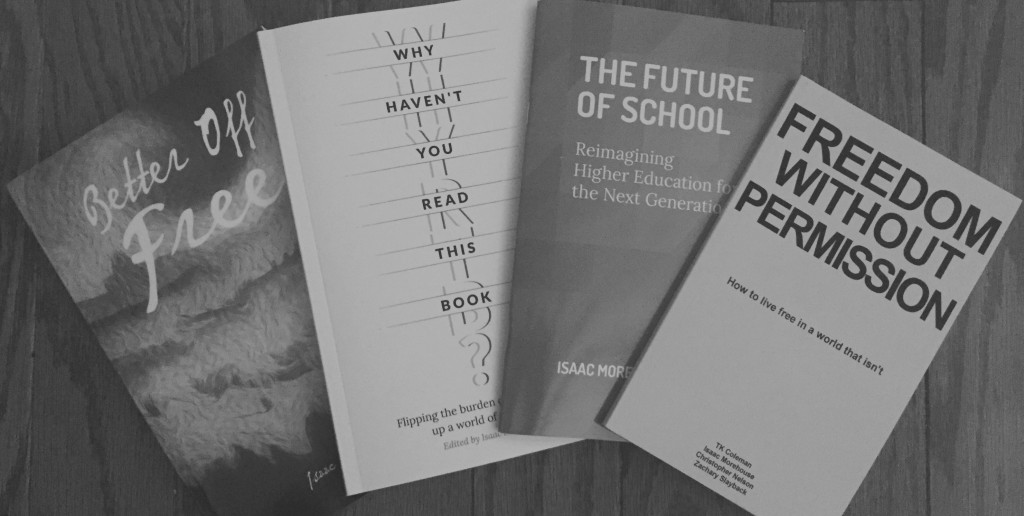I’m not big on goals and goal-setting. I’ve done it at various points, and it’s had a few positive effects and can be somewhat fun, or at least useful in challenging me to think bigger. Still, I find that I’m more of an opportunist than a planner. I prefer to keep building things – myself, my project, social capital, etc. – and be aware and alert to opportunities to leverage those things.
This means creating and succeeding and finishing things in general is more important much of the time than any perfectly plotted sequence of what it is I’m doing. I try to cultivate creativity as a discipline, while what I use my creative energies for remains flexible to seize opportunities. I want to also cultivate opportunity spotting abilities and the willpower to act on them and see it through to completion. “Be ready in season and out of season.”
What this translates into practically for me is a series of very small, daily (sometimes weekly) challenges. Things that are a little difficult, but simple enough that I have no excuse for missing them. My typical set of challenges is this:
- Blog every day
- Do one form of exercise every day
- Walk outside every day
- Consume ideas every day
- Do one thing to add value to Praxis every day (in the areas of money, talent, and vision specifically)
Many days I do more than this. I might write a blog post and a newsletter or book chapter. I might go for a swim and ride my bike. I might read several articles and listen to a podcast. I typically do many things to add value to Praxis in a day. The trick is, doing at least one form of each of these in a day, every single day rain or shine seven days a week. The fact that they’re so easy is what makes it so hard.
If I had “Run five miles every day”, or, “Train for a marathon” on the list, I wouldn’t feel bad about myself if I missed a day or two. You wouldn’t look down on me either. It’s a tough goal, and you might be impressed that I even tried. But doing one form of exercise every day is so damn easy – some days I literally do a handful of pushups and that’s it – if I miss a few days I feel like a loser, and you’d be a little confused as to how I was unable to complete something so easy.
For me, a big, grandiose, far-off goal like, “Be in peak physical shape”, or, “Make $X by 2017” doesn’t do a lot to help me optimize my days. It’s too easy to slack and think you can make it up later. It’s too easy to not push because no one will look down on you for missing your goal. But blogging every day is totally visible to all and totally doable. It might suck, but it can be done if you really want to. I’ve even written some posts on tough days that were nothing more than a haiku about how hard daily blogging is (Salvation by Haiku!). One day I wrote a post that was a single word.
But I did it.
By showing up and completing it every day, I learn to succeed. I learn to create as a discipline, not in response to a mood. I also add value to myself every single day by this practice. Maybe only a fraction of a percent, but if you know the power of compound interest, you can see how much this can add up when you show up daily.
I recently tried a 30 day experiment going a little more abstract with my daily challenges. I switched it up so I had to do one thing each day for my…
It didn’t go well. It was too easy to begin to define things in weird ways so that I could check the spreadsheet off (I love checking items off). I mean, I walked outside, so that’s good for my body, and my spirit, and I thought about stuff with my mind, so I hit them all, right? But it wasn’t a challenge and I never felt that pride for completing it. I needed to go back to my tiny, silly, well-defined challenges.
Maybe you work well with bigger, longer term goals and plans. But if they don’t work for you, try a 30 day challenge of a few small things that you have no excuse for skipping. You might be amazed at how good it makes you feel to deliver, especially on the really hard days.
The added benefit of doing something creative like writing is that creativity begets creativity, and you’ll become a font of ideas for business, personal, and even other people’s use. Give them away. Act on them. Ideas are infinite and the more you create the more you get.
Like this:
Like Loading...
